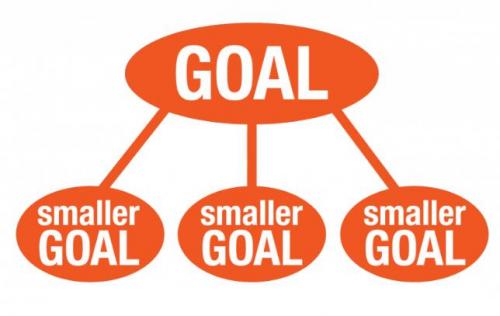

"Why Goal Setting Is So Hard"

The above items are not goals, they are more like dreams or desires. Most of us assume that if we write a goal down, then we will be naturally motivated to achieve it. But since we don’t know where to start, we often don’t. Or don’t make it very far.
Irrelevant. The next impediment to achieving our goals has to do with relevance. Too often, our goals are influenced by those around us or what we consume on social media or television. We compare ourselves to others instead of asking ourselves the (extremely hard) question: What do I actually want from my life? And when goals aren’t internally driven, our motivation to persevere quickly evaporates.
Unachievable. Not every goal is possible for every person. For example, if your roommate just lost thirty pounds and can now bench press two hundred and fifty pounds, that doesn't mean that this should be your goal, too. To understand whether this goal is achievable for you, you need to ask yourself a number of questions. For example, 1) Is now the right time? Maybe you just had surgery in the last year and you should be focusing on regaining mobility, not gaining muscle. 2) Do you have the time? If you are just out of law school or travel a lot for work, finding time to get to the gym with any kind of consistency will be a towering challenge. 3) Do you have sufficient resources to achieve this goal? Perhaps a gym membership is not in your budget right now, and you have no space for a home gym. This will make it hard to get in any reps.
2. Little or no plan for how to achieve your goals:
Our goals often fall victim to the “Go Big or Go Home” mentality—we try to set Big Goals to make a Big Impression. Our culture loves a success story, but often in the telling of these stories, all of the small, mundane, unsexy steps on the way to success are completely left out. We only read about the amazing results, not the time and toil it took to get there.
Thus, when we set big goals for ourselves, we generate a lot of initial motivation and momentum. But oftentimes, our efforts falter: we miss a day, or other work beckons. We defer, we delay, and eventually, all of that initial energy dissipates and our goal languishes. That’s why gyms are packed in January but by February, you no longer have to wait to use a piece of equipment.

Why? Because we failed to account for HOW we would fit this new goal into our daily life. How much time is required? How frequently do we need to repeat the action or behavior in order to complete the goal? When and where are we going to do it? And finally, how does it align with our purpose, our identity, or our desired outcome?
When we don’t take the time to think through how we're going to get something done, it's extremely easy for life to knock us off course. Which leads me to the last obstacle…
3. No process or system for accomplishing our goals:
More often than not, we treat our goals like we treat our to-do list. It’s a jumble of things we need to do today, this week, this month, this year.
Goal setting is a process. First, it’s imperative that we stop and ask ourselves:
- Why is this goal important right now?
- What does success look like for this goal?
- What are all the possible steps for completing this goal?
- And most importantly, what is the next action we need to take to move the goal forward?
A goal by itself is a binary outcome. We either did it, or we didn’t. Achieving our goals is a process. And a process requires putting a system in place that will make working towards that goal both sustainable and successful.
Let’s use the example of a professional athlete who wants to win a championship. That’s the goal. For the athlete, success looks like hoisting a shiny trophy up over their head, brow brimming with sweat, surrounded by teammates and coaches, and the satisfaction and pride on their face visible to the thousands of fans cheering their name.
Many of us regular folk stop there, with the glorious vision of our success floating in front of our eyes, and simply hope that all of the steps toward that goal will naturally appear. But hope is not a strategy.
On the other hand, the professional athlete will make a detailed plan. They will assess how they spend their time and create a targeted program for improving on every dimension of their physical and mental well-being. They might make changes to their diet, make sure to sleep more, get to the gym earlier, and watch videos of themselves and their competitors.

In other words, they create the systems for success by breaking down the individual components of their goal into actionable steps. And then they execute. They have a morning routine, a workout routine, a plan for their diet, and set aside time to watch game videos and to recover from matches. Finally, they have coaches to help them design these systems, and, even more importantly, to keep them accountable for adhering to them.
Executing a goal entails creating the systems and routines that anchor the behavior changes that will be essential to completing the goal.
This is why finding someone to be an accountability partner is critical. It’s why people that want to run marathons join a running club. Or those who want good grades form a study group. Even if you don't have a coach, finding some sort of accountability partner, whether it's someone who has a similar goal, a different goal, or even someone who is just great at checking up on you, is essential to help keep you on track.
Goals are important. They provide direction and a measurement of progress in our lives. Where we tend to get stuck is when we don't take the time to think and plan ahead. To make sure the goal is both important to us and achievable. Too often, we rely on that initial burst of motivation, but life has a funny way of knocking us off course. And when it inevitably does, we bargain with ourselves in order to fool ourselves into thinking that we will do it later. Tomorrow. Or maybe now's just not the time at all. We can't rely on motivation. We need a better process.
To set up this, taking some time up front is key. Clarify exactly what it is that you want to do, by when, were, and with whom you're going to do it. Look at your current life and ask yourself if you need to subtract anything to make room for this new goal. Then, create the plans, routines, and tracking system to measure your progress. Finally, find someone to help keep you accountable, especially in the beginning. Doing this, you have set up a process for actually achieving your goals.
In the next article, I will walk you through how to use SMART goals as a tool to better clarify your goals. By using this framework, you will significantly increase the odds of achieving your goals this year and beyond.
